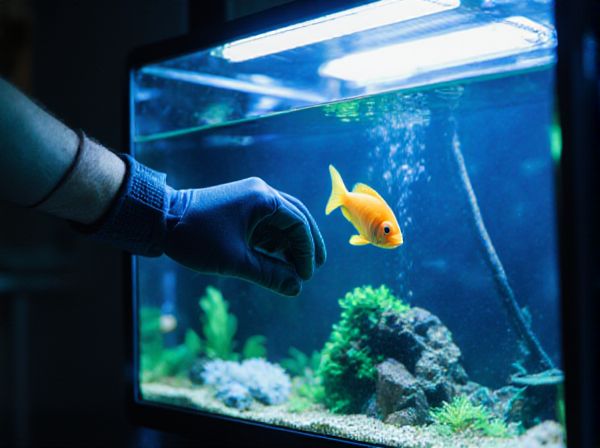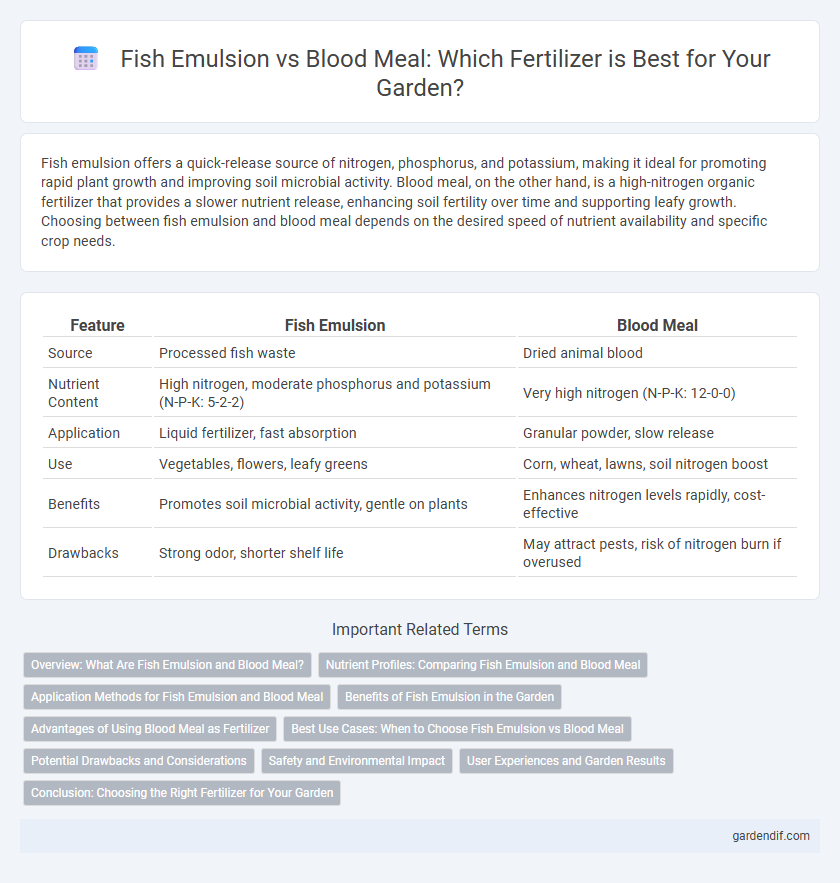
Fish emulsion vs blood meal Illustration
Fish emulsion offers a quick-release source of nitrogen, phosphorus, and potassium, making it ideal for promoting rapid plant growth and improving soil microbial activity. Blood meal, on the other hand, is a high-nitrogen organic fertilizer that provides a slower nutrient release, enhancing soil fertility over time and supporting leafy growth. Choosing between fish emulsion and blood meal depends on the desired speed of nutrient availability and specific crop needs.
Table of Comparison
| Feature | Fish Emulsion | Blood Meal |
|---|---|---|
| Source | Processed fish waste | Dried animal blood |
| Nutrient Content | High nitrogen, moderate phosphorus and potassium (N-P-K: 5-2-2) | Very high nitrogen (N-P-K: 12-0-0) |
| Application | Liquid fertilizer, fast absorption | Granular powder, slow release |
| Use | Vegetables, flowers, leafy greens | Corn, wheat, lawns, soil nitrogen boost |
| Benefits | Promotes soil microbial activity, gentle on plants | Enhances nitrogen levels rapidly, cost-effective |
| Drawbacks | Strong odor, shorter shelf life | May attract pests, risk of nitrogen burn if overused |
Overview: What Are Fish Emulsion and Blood Meal?
Fish emulsion is a liquid organic fertilizer derived from processed fish parts, rich in nitrogen, phosphorus, and potassium, providing essential nutrients for plant growth. Blood meal is a dry, powdered fertilizer made from dried animal blood, primarily offering a high concentration of nitrogen to promote leafy growth. Both fertilizers supply vital nutrients but differ in form, nutrient balance, and application methods.
Nutrient Profiles: Comparing Fish Emulsion and Blood Meal
Fish emulsion provides a balanced nutrient profile high in nitrogen, phosphorus, and potassium, with essential micronutrients that promote overall plant health and growth. Blood meal, characterized by its concentrated nitrogen content, serves as a powerful organic fertilizer specifically enhancing leaf development and greening. Choosing between fish emulsion and blood meal depends on crop nutrient requirements and desired growth outcomes, with fish emulsion offering a more comprehensive nutrient mix and blood meal delivering a targeted nitrogen boost.
Application Methods for Fish Emulsion and Blood Meal
Fish emulsion is commonly applied as a liquid foliar spray or soil drench, delivering readily available nutrients for rapid plant uptake and effective nutrient absorption. Blood meal, typically used in powdered form, is incorporated directly into the soil to provide a slow-release source of nitrogen that enhances soil fertility over time. Both fertilizers require careful dosage adjustment based on crop type and growth stage to maximize nutrient efficiency and minimize environmental impact.
Benefits of Fish Emulsion in the Garden
Fish emulsion is a nutrient-rich organic fertilizer that provides a balanced blend of nitrogen, phosphorus, and potassium essential for healthy plant growth in gardens. Its high nitrogen content promotes vigorous leaf and stem development, while trace minerals improve soil fertility and microbial activity. Unlike blood meal, fish emulsion is water-soluble, allowing for quick nutrient absorption and reducing the risk of nitrogen burn in plants.
Advantages of Using Blood Meal as Fertilizer
Blood meal is a superior fertilizer rich in nitrogen, which promotes vigorous leafy growth and improves soil fertility rapidly. Its slow-release properties minimize nutrient runoff and provide a steady nutrient supply, enhancing plant health over time. Unlike fish emulsion, blood meal has a longer shelf life and is less likely to emit strong odors, making it a convenient choice for gardeners seeking effective organic fertilization.
Best Use Cases: When to Choose Fish Emulsion vs Blood Meal
Fish emulsion is ideal for fast-acting nutrient delivery in leafy vegetables and acid-loving plants due to its high nitrogen content and quick absorption. Blood meal provides a slow-release nitrogen source best suited for heavy feeders like corn and corn stalks, promoting sustained growth and soil enrichment. Choosing fish emulsion enhances immediate plant recovery, while blood meal supports long-term soil fertility and nitrogen supplementation.
Potential Drawbacks and Considerations
Fish emulsion fertilizer may emit a strong odor that can attract pests and requires careful application to avoid over-fertilization, which can harm plants. Blood meal, rich in nitrogen, can burn plants if applied in excess and may attract wildlife, posing a challenge for garden protection. Both fertilizers demand precise dosing and timing to maximize nutrient uptake while minimizing environmental impact and pest issues.
Safety and Environmental Impact
Fish emulsion is a safer organic fertilizer with low risk of chemical burns and minimal environmental toxicity, promoting healthy soil microbes and plant growth. Blood meal offers high nitrogen content but poses a higher risk of odor issues, potential pathogen presence, and can lead to nitrogen runoff if overused. Choosing fish emulsion reduces groundwater contamination and supports sustainable gardening practices better than blood meal.
User Experiences and Garden Results
Fish emulsion provides a balanced nutrient profile with quick nutrient release, leading to faster green growth and improved soil microbial activity, as reported by gardeners seeking gentle, organic feeding. Blood meal offers high nitrogen content that promotes vigorous leafy growth but can risk over-fertilization and soil pH imbalance if not used carefully, according to user feedback in vegetable and lawn gardens. Many gardeners note that fish emulsion enhances plant resilience and root development more effectively, while blood meal is preferred for its cost-effectiveness and concentrated nitrogen punch in nitrogen-deficient soils.
Conclusion: Choosing the Right Fertilizer for Your Garden
Fish emulsion offers a balanced blend of nitrogen, phosphorus, and potassium, promoting rapid plant growth and improved soil microbial activity, while blood meal provides a concentrated nitrogen source for leafy green development. Selecting the right fertilizer depends on your garden's specific nutrient demands, with fish emulsion favored for organic, gentle feeding and blood meal ideal for heavy nitrogen feeders. Assess soil conditions, plant types, and growth stages to determine the most effective fertilizer for optimal garden health and yield.
Fish emulsion vs blood meal Infographic

 gardendif.com
gardendif.com